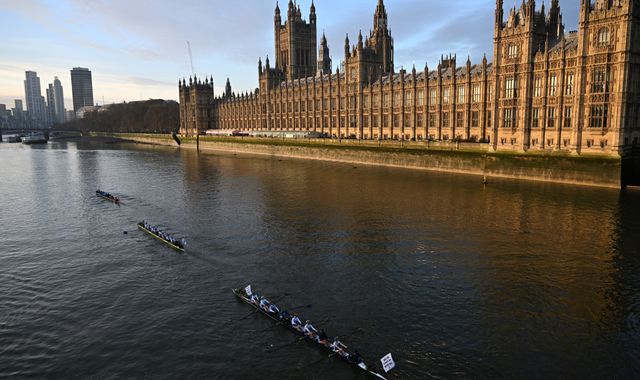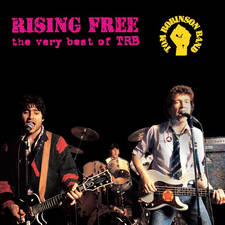Strangers' Bar: The Commons venue that changed political history
17 January 2025, 17:51 | Updated: 17 January 2025, 20:45

It's a bar that has changed the course of political history. And now it has made history again by being closed after a drink-spiking allegation.
It's the hub of social life in parliament, packed with MPs on nights of big Commons votes and a hotbed of intrigue, gossip, and political scandal.
In 1990, on the day of the first ballot in the Tory leadership election, Conservative MPs who had steadfastly supported Margaret Thatcher for more than a decade gathered in Strangers' Bar at 11am.
There they ordered large whiskies to pluck up the courage to stab their heroine in the back and vote for Michael Heseltine.
"If I'm to commit political suicide, I need a drink first," said a clubbable and extrovert Tory MP Barry Porter that night, convinced that he had signed his political death warrant.
Politics latest: Reform and Tories 'desperate' in approach to Trump
Instead, he and the Iron Lady's other backbench deserters had signed hers, though, in a twist of fate, she was succeeded not by Michael Heseltine but by John Major.
More than a decade later, in 2012, it was the history of the Labour Party that was changed dramatically by a night of mayhem in Strangers' Bar.
Falkirk MP Eric Joyce, who witnesses said was angry and drunk, started a brawl which led to him being convicted of assaulting two MPs and two Conservative councillors, shortly before closing time.
In extraordinary scenes, Mr Joyce headbutted Conservative MP Stuart Andrew, now shadow culture secretary, leaving him with a bloody nose and concussion, and punched Phil Wilson, who was Tony Blair's successor as MP for Sedgefield.
Never has a pub brawl had such far-reaching consequences for British politics.
In the contest to select Mr Joyce's successor in Falkirk, the giant Unite union was accused of trying to stitch up the candidate selection for left-winger Karie Murphy, who was close to the union's general secretary, Len McCluskey.
But in what Labour moderates claim to this day was a catastrophic blunder, Labour leader Ed Miliband attempted to break the power of the unions by ditching the electoral college and introducing one-member-one-vote.
He also slashed the price of party membership from £52 to £3, with the result that thousands of left-wing activists joined and Jeremy Corbyn was elected leader, beating Andy Burnham, Yvette Cooper and Liz Kendall.
However, not even the Eric Joyce brawl resulted in the closure of Strangers', the parliament's busiest bar, used by MPs and their guests, researchers and Commons staff and - naturally - political journalists.
But now it will be closed next week while security arrangements are reviewed after a researcher claimed her drink had been spiked at about 6.30pm on Tuesday 7 January, in the first week after parliament returned from recess.
The decision, which critics will no doubt claim is an overreaction, was taken by Commons Speaker Sir Lindsay Hoyle, in consultation with the clerk of the House, Tom Goldsmith, and the director of parliamentary security, Alison Giles.
A House of Commons spokesperson said: "Strangers' Bar will close from Monday 20 January while security and safety arrangements are reviewed. The safety of everyone on the estate remains a key priority of both Houses."
The move will be welcomed, however, by those critics who have long attacked what they claim is a drinking culture in parliament, though these days it's nothing like it was when the Commons regularly sat until late at night and often until the early hours.
There have also been countless allegations of groping and other sexual misconduct fuelled by alcohol in Strangers', often made against MPs by young parliamentary staff members and political researchers.
How long the bar will remain closed has yet to be decided. More information will be provided once the review has concluded, the parliamentary authorities have said.
But could the closure become permanent? Or could there be a cut in the bar's opening hours or new restrictions on who can use the bar?
In 2018, Sir Lindsay's predecessor, John Bercow, was accused of trying to introduce a "prohibition-style" drink ban at Westminster when he suggested a ban on alcohol sales throughout the Commons during the day.
But there are already signs that curbs on a so-called booze culture could now be on the way. The new all-party modernisation committee, created by Sir Keir Starmer's government and chaired by the Commons leader Lucy Powell, has already been urged by a group of Labour MPs to restrict the sale of alcohol.
Strangers' may be the most high-profile bar in parliament and the one most frequented by MPs, but it's by no means the only one.
Another bar, named the Woolsack but formerly the Sports and Social Club, underwent a rebrand after a series of brawls and other misconduct scandals.
Read more:
Badenoch hits back at claims she would means test triple lock
Starmer says Auschwitz visit 'utterly harrowing'
But if Labour whips do back calls to shut the bars in parliament, they should be careful what they wish for. When the bars closed during COVID, MPs drank in the Civil Service, a club for Whitehall mandarins and diplomats close by.
Westminster also has several pubs within a short walk from parliament: St Stephen's Tavern, the Westminster Arms, the Red Lion and the Marquis of Granby. There are more along Whitehall towards Trafalgar Square.
Although Labour's massive majority means there are no longer close votes in the Commons, if MPs are drinking in bars inside Parliament, it's easier for the whips to keep an eye on them and know where they are.
Not that the whips had much success in the past in preventing history being made in Strangers' Bar.
(c) Sky News 2025: Strangers' Bar: The Commons venue that changed political history












